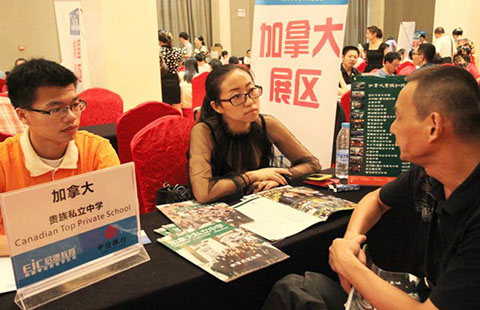Hacking blame a US power play: experts
Updated: 2015-08-13 06:12
By ZHAO SHENGNAN, CHEN WEIHUA(China Daily USA)
|
||||||||
Washington has launched a war of words over cybersecurity against China before President Xi Jinping’s US trip next month, a move that analysts say attempts to set the agenda for the state visit and put pressure on Beijing.
During a CBS Evening News television interview on Tuesday, US Secretary of State John Kerry accused China and Russia of “very likely” reading his e-mails.
Cyberattacks have been a topic of ongoing discussions with China and will be so again when US President Barack Obama hosts Xi in Washington in September, the top US diplomat said.
Kerry’s allegations followed an NBC report that claimed Chinese “cyberspies” have accessed the private e-mails of “many” top Obama administration officials since at least April 2010.
Zhu Haiquan, spokesman for the Chinese embassy in Washington, dismissed the NBC report.
He told Chinese media on Monday that China is a major victim of cyberattacks, and that the Chinese government firmly opposes all forms of cyberspying.
Fighting cross-border cyberattacks requires international cooperation, while “groundless accusations and microphone diplomacy won’t resolve any problems but only make things worse”, Zhu said.
Li Haidong, a professor of US studies at China Foreign Affairs University, said Washington is trying to inflame the issue through a series of accusations against China as a means of setting the agenda for Xi’s upcoming visit to the US.
“Washington often stands against China over issues like cybersecurity and the South China Sea, as it believes that China’s diplomacy and growing economic clout challenge US global leadership,” Li said.
Ni Feng, an expert on US studies at the Chinese Academy of Social Sciences, said that US cybertechnologies are far more advanced than China’s, and that the US business sector is a main force behind the US government’s pressing China.
The Financial Times reported in July that the FBI has labeled China “the most dominant threat” to US companies and believes Beijing was the main culprit behind a sharp increase in economic espionage cases its agents were investigating.
Ni said the two sides haven’t found a solution to issues such as cybersecurity, and previous dialogue over the topic stalled after the US indicted five Chinese military officers last year on allegations of cybertheft.
But he added that Xi’s visit is expected to go smoothly and hardly be affected by the accusations — a measure that the US often uses to take the initiative before a high-level visit.
On Wednesday, former US ambassador to China Joseph Prueher told China Daily that he would like to think Xi and Obama would have good communications between them in the September meeting in Washington.
“That they would have some realistic goals, that they will put the wellbeing of how our countries can work together in a very high priority,” he said on the sidelines of a talk at the Center for Strategic and International Studies.
“It’s very difficult. Both of them have domestic constituencies they answer to. These tend to drive the issue more than the international issues. But I would like to see the international issues raised to a higher level,” said Prueher, who was commander of the US Pacific Command before becoming ambassador to China from 1999 to 2001.
Besides exaggerating the threat of Chinese cyber attacks, the US has also sought to portray China as a military threat to the world, with US General Joseph Dunford naming Russia and China last month the top two security threats to the US, something Secretary Kerry disagreed with.
The US is believed to have the largest and strongest cyber army in the world. Revelations by Edward Snowden, the former contractor for the NSA, showed that the NSA is spying on both Americans and people in other countries, including its military allies, such as Germany and Japan.
US military spending equals the military budgets for the next top seven countries combined.
Contact the writers at: zhaoshengnan@chinadaily.com.cn or chenweihua@chinadailyusa.com.
Most Viewed
Editor's Picks

|

|

|

|

|

|
Today's Top News
12 firefighters among 44 killed in Tianjin explosions
Hacking blame a US power play: experts
Seattle's tallest building sold
Alibaba falls behind Amazon
Seven killed, 180 injured in N China blast
S. Korean president to visit US in October: White House
Hillary Clinton relents in e-mail inquiry amid campaign
Accusations of Chinese hacking are a US power play, experts say
US Weekly

|

|














